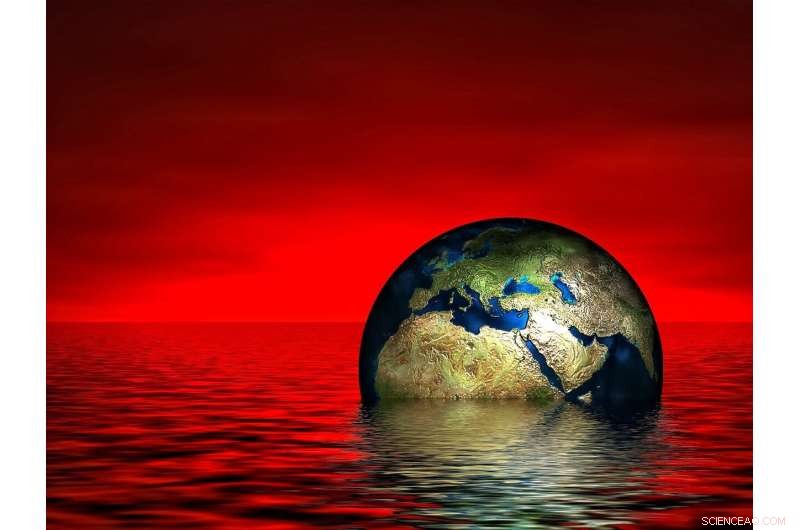
Credito:Pixabay/CC0 di dominio pubblico
"Crisi" è una parola incredibilmente potente, quindi è interessante testimoniare il modo in cui la frase "crisi climatica" è diventata parte della lingua franca.
Un tempo associata solo a pochi scienziati e attivisti "schietti", la frase è ora diventata mainstream.
Ma cosa intende la gente con il termine "crisi climatica"? E perché importa?
Il mainstreaming del discorso di crisi
Non sono solo gli attivisti o gli scienziati a dare l'allarme.
Il segretario generale delle Nazioni Unite Antonio Guterres ora usa abitualmente frasi drammatiche come "scavare le nostre stesse tombe" quando si parla di clima. Bill Gates ci consiglia di evitare il "disastro climatico".
Questo mainstreaming linguistico segna linee di battaglia ridisegnate nelle "guerre per il clima".
Il negazionismo è in ritirata. Il dibattito sul cambiamento climatico ora riguarda cosa deve essere fatto e da chi?
Gli scienziati, utilizzando la piena autorità della loro professione, sono stati la chiave per cambiare il discorso. Gli autori principali dei rapporti dell'Intergovernmental Panel on Climate Change (IPCC) ora non tirano pugni, parlando apertamente di fame di massa, estinzioni e disastri.
Queste figure pubbliche sperano chiaramente di spingere cittadini, imprese e governi in un'azione radicale per il clima.
Ma per molte persone comuni, il cambiamento climatico può sembrare lontano dalla vita di tutti i giorni. Non è una "crisi" nell'immediato modo in cui è stata la pandemia.
Naturalmente, molti ritengono che gli esperti di clima abbiano sottovalutato il problema per troppo tempo.
Eppure la nuova ubiquità di termini da sirena come "crisi" climatica, "emergenza", "disastro", "guasto" e "calamità" non garantisce alcuna comprensione condivisa, per non parlare credibile, del loro possibile significato.
Questo è importante perché tali termini tendono a polarizzarsi.
Pochi ora dubitano della realtà del cambiamento climatico. Ma il modo in cui descriviamo le sue implicazioni può facilmente ripetere i precedenti contrasti tra "credenti" e "scettici"; "realisti" e "spaventatori". Il risultato è ancora più inerzia politica e ingorghi.
Dovremo fare di meglio.
Quattro idee per una nuova strada da seguire
Termini come "crisi climatica" sono qui per restare. Ma scienziati, insegnanti e politici devono essere esperti. Una profonda consapevolezza di ciò che le altre persone possono pensare quando ci sentono gridare "crisi!" può portare a una migliore comunicazione.
Ecco quattro idee da tenere a mente.
1. Dobbiamo sfidare le narrazioni distopiche e di salvezza
Una crisi è quando le cose vanno in pezzi. Ogni giorno vediamo notizie di crisi:inondazioni in Pakistan, crollo economico in Sri Lanka, carestia in alcune parti dell'Africa.
But "climate crisis" signifies something that feels beyond the range of ordinary experience, especially to the wealthy. People quickly reach for culturally available ideas to fill the vacuum.
One is the notion of an all-encompassing societal break down, where only a few survive. Cormac McCarthy's bleak book The Road is one example.
Central to many apocalyptic narratives is the idea technology and a few brave people (usually men) can save the day in the nick of time, as in films like Interstellar.
The problem, of course, is these (often fanciful) depictions aren't suitable ways to interpret what climate scientists have been warning people about. The world is far more complicated.
2. We must bring the climate crisis home and make it present now
Even if they're willing to acknowledge it as a looming crisis, many think climate change impacts will be predominantly felt elsewhere or in the distant future.
The disappearance of Tuvalu as sea levels rise is an existential crisis for its citizens but may seem a remote, albeit tragic, problem to people in Chicago, Oslo or Cape Town.
But the recent floods in eastern Australia and the heatwave in Europe allow a powerful point to be made:no place is immune from extreme weather as the planet heats up.
There won't be a one-size-fits-all global climate crisis as per many Hollywood movies. Instead, people must understand global warming will trigger myriad local-to-regional scale crises.
Many will be on the doorstep, many will last for years or decades. Most will be made worse if we don't act now. Getting people to understand this is crucial.
3. We must explain:a crisis in relation to what?
The climate wars showed us value disputes get transposed into arguments about scientific evidence and its interpretation.
A crisis occurs when events are judged in light of certain values, such as people's right to adequate food, healthcare and shelter.
Pronouncements of crisis need to explain the values that underpin judgements about unacceptable risk, harm and loss.
Historians, philosophers, legal scholars and others help us to think clearly about our values and what exactly we mean when we say "crisis."
4. We must appreciate other crises and challenges matter more to many people
Some are tempted to occupy the moral high ground and imply the climate crisis is so grand as to eclipse all others. This is understandable but imprudent.
It's important to respect other perspectives and negotiate a way forward. Consider, for example, the way author Bjørn Lomborg has questioned the climate emergency by arguing it's not the main threat.
Lomborg was widely pilloried. But his arguments resonated with many. We may disagree with him, but his views are not irrational.
We must seek to understand how and why this kind of argument makes sense to so many people.
Le parole contano. It's vital terms like "crisis" and "calamity" don't become rhetorical devices devoid of real content as we argue about what climate action to take. + Esplora ulteriormente
Questo articolo è stato ripubblicato da The Conversation con licenza Creative Commons. Leggi l'articolo originale. 